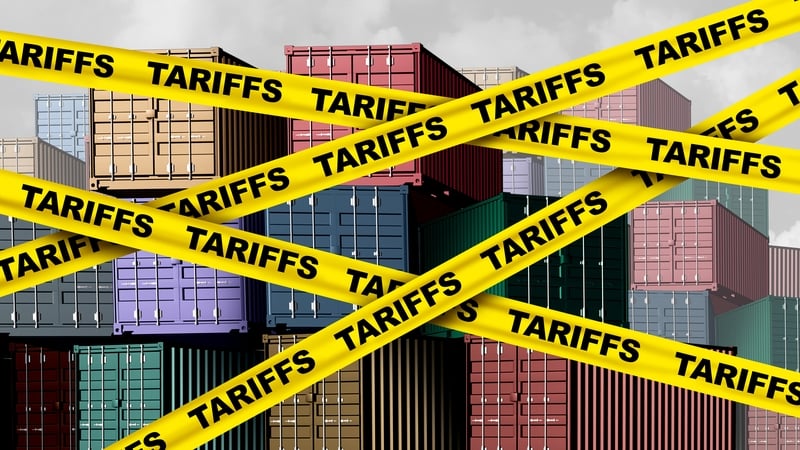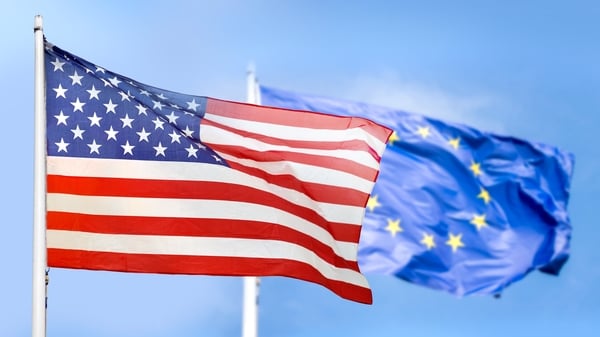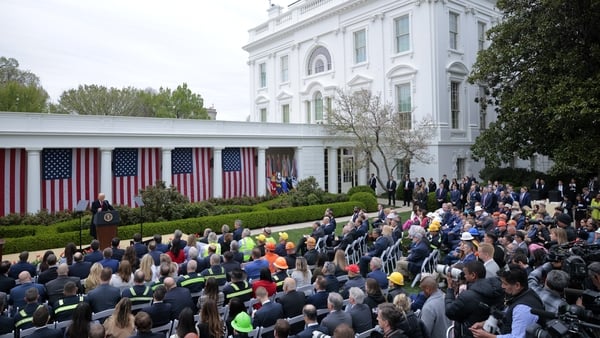Following US President Donald Trump's tariff announcement, the EU finds itself delicately poised between calm, worry and assertiveness.
Europe is desperate to avoid an escalating trade war but wants to warn the Trump administration it can hit back hard to get leverage in an expected negotiation period.
Maintaining that balance and unity of purpose while the foundations of global trade start to crumble will be no small feat.
The EU is already concerned about a flood of electrical goods from China and Vietnam after those countries were hit by higher tariffs than expected.
While Trump slapped a blanket 20% tariff on most EU exports, some member states and industries are more exposed than others.
The US president has deliberately created what he hopes will be a marketplace of desperation, whereby trade delegations from across the globe trample over each other to pay tribute to the tariff king in the hope of securing exemptions.
"Some member states are looking for a bit more assertiveness, and others are emphasising the need for cooperation and building bridges," says one EU diplomat.
"But all of that is within the margin of everyone agreeing that we're in this together, that we are stronger together in tackling this."

The contrast to how Europe responded to Trump’s 25% tariffs on steel and aluminium on 12 March is noteworthy: within hours, Commission president Ursula von der Leyen had announced retaliatory tariffs worth €26 billion on a list of US imports.
This time there is no list, at least not yet.
"We will not speculate on what we will do," a Commission official said on Thursday.
"We are ready to react, and we will do that on the basis of the solid analysis that is currently being conducted by Commission services."
However, retaliation against the 25% steel and aluminium tariffs will happen.
The Commission drew up a 99-page list of US products that could be targeted, essentially reinstating tariffs dating back to the first Trump administration which had been suspended.
Read more:
Record market decline as 'baseline' Trump tariffs kick in
What US exports has China hit with retaliatory tariffs?
Italy warns against counter-tariffs on US, calls for budget leeway
Largesse cannot continue as Ireland enters new era
The list was then put to member states who lobbied for certain US products to be withdrawn (or added) depending how they thought the Trump administration would react.
"Twenty-seven member states have come up with their own list of offensive and defensive objectives," says one EU diplomat.
"It’s up to the Commission to weigh those up and they will take into account two principal factors: one is that the value of our countermeasures should be commensurate with the value of the American measures. Secondly, the economic pain has to be distributed evenly across member states. If the burden were to be carried by only a few, that’s the quickest way to erode support."
Prominent in the list has been products like bourbon, Harley Davidson motorbikes and denim.
After Trump threatened to counter-retaliate with 200% tariffs on European wine and spirits, Ireland, France and Italy lobbied for bourbon to be dropped, with Dublin pushing hard at official and political levels (Minister for Foreign Affairs Simon Harris raised the issue on Thursday with trade commissioner Maroš Šefčovič).
'They're not telling anyone in advance of Monday’s meeting'
Minister Harris will join other trade ministers in Luxembourg on Monday to sign off on the final list, which trade officials are keeping under wraps.
"The Commission has been taking all these inputs [from member states], which have been many, and assessing them," says one source. "They’re not telling anyone in advance of Monday’s meeting."
On Wednesday diplomats in Brussels are expected to then approve the list through a so-called reverse qualified majority vote (ie, capitals can only block the list if there's a qualified majority against it, meaning it’s a high bar).
The measures will take effect on 15 April.
That still leaves Trump’s so-called Liberation Day "reciprocal" tariffs.
Senior Commission officials have been breaking down the impact.
Combined with the tariffs on steel and aluminium, and the 25% Trump slapped onto European car exports, Wednesday’s tariffs will bring the value of EU goods affected by new tariffs to €380 billion, or 70% of all exports to the US.
Should those exports continue at current levels, US customs officials would collect €81 billion this year in tariff revenue, compared to the €7 billion they normally collect.
"That is a massive jump," says a senior EU official.
This is just one of the realities Commission trade experts will assess before the EU announces its overall response.
'Almost as random as taxing you on the number of vowels in your name'
First, they’re having to parse President Trump’s by now universally ridiculed methodology which delivered the notion that the EU charges an average tariff of 39% on US imports.
Numerous experts have concluded that US Treasury officials simply subtracted what a country bilaterally exports to the US from what it imports, then divided the result by two in order to come up with a new tariff to apply to that country (pity poor Lesotho, with a life expectancy of 42.5 years at birth, which gets hit with a 50% tariff, the highest applied to any country).
The Economist described this as "almost as random as taxing you on the number of vowels in your name".
The method reflects Trump’s decades-old gripe that a trade deficit means the exporting country is screwing the US (he actually used the term "rape" in the Rose Garden). In reality, there is a multitude of factors: the US imports millions of tonnes of bananas and coffee because it can’t grow these commercially at home. Is the US being screwed there?
Furthermore, the Trump administration argued that the 39% figure reflected so-called non-tariff barriers to US exports, such as the prohibition on chlorine-washed chicken or hormone beef, or VAT, even though that is a non-discriminatory tax which applies to everyone, be they a domestic consumer or an exporter.
"There was no effort, not even a pretend effort, to kind of create some sort of assessment of all that, and then, on that basis, to apply tariffs," says one EU source.
What is the EU’s average tariff rate on US goods?
Figuring that out is complicated. The EU has 110 different tariff lines on chicken meaning it distorts the overall average, even though the EU does not export huge volumes of poultry to the US.

"You need to look at the tariffs and the volume of trade that comes in under these tariff lines to come to a realistic assessment of how high the level of protection is," says an EU official.
In an explanatory note in February, the Commission said that "considering the actual trade in goods between the EU and US, in practice the average tariff rate on both sides is approximately 1%".
That’s why the EU rejects the notion that Trump just wants to "get even" through "reciprocal tariffs", with officials saying that an EU negotiating strategy will be to convince the Trump administration that reciprocity can and should go in the opposite direction.
"Reciprocity, sure," says a senior official. "We know the concept, and we work with it. But why increase tariffs? Why not decrease tariffs? This is an indication of what will be part of the negotiation."
The European Commission says that 70% of the goods entering the EU comes in at a zero tariff rate, either through one of the 76 preferential trade agreements the EU has signed, or even via basic WTO terms (the EU will not put a tariff on an import which is vital, such as rare earth minerals.)
Brussels is working on the belief that having announced its battery of new tariffs across the globe, the Trump administration will now be in negotiation mode.
When he went to Washington on 25 March for meetings with Commerce Secretary Howard Lutnick and Trade Secretary Jamieson Greer, Maroš Šefčovič came back empty handed.
"Up until now, there was absolutely zero conversation with the administration about a negotiation, about exemptions," says one EU diplomat. "But it was made clear that that was to be until Liberation Day."
Hence Šefčovič’s call with his US counterparts yesterday [Friday]. "That call was about figuring out if there's space for negotiations and if so, what are the parameters for that, and then to feed that into the trade ministers meeting [in Luxembourg] on Monday."
When member states approve the retaliation for the steel and aluminium tariffs on Wednesday, that will at least show the Trump administration that the EU can hit back.
The question will then be one of timing.
"It might be that member states conclude this is the time to ramp up pressure through counter measures of our own in order to get to a space where we can more credibly negotiate," says one EU diplomat. "We simply don't know at this point."
Another source says: "The question is, how do you get to a negotiation in a position that gives you a good chance of a good outcome."
One problem, however, is the question of who the European Commission will be negotiating with?
While Howard Lutnick, a billionaire Wall Street financier, and Jamieson Greer, a trade lawyer, are keen on tariffs, the real ideologue is Peter Navarro, a fierce Trump loyalist who spent four months in prison rather than testify against him over the January 6th attempted insurrection.

Diplomats question whether the EU’s interlocutors - Lutnick and Greer - hold the same sway over Trump as the tariff zealot Navarro. Remarks by Trump’s son Eric suggest the administration, having launched "Liberation Day" are sitting back to wait for a feeding frenzy of countries and companies looking to strike favourable deals.
"I wouldn’t want to be the last country that tries to negotiate a trade deal with @realDonaldTrump," he posted on X. "The first to negotiate will win - the last will absolutely lose. I have seen this movie my entire life…"
Yet the sheer audacity of Mr Trump's tariffs - higher than most analysts had expected - may limit his potential for retaliating against any EU counter measures.
This is because the 20% tariffs will already have pushed many companies out of the US market.
"By going all the way to 20% with your first move you're not going to be effective when you have to respond to, for example, EU retaliatory tariffs," says Todd J. Friedbacher, a trade lawyer with Sidley Austin LLP, a US law firm.
"Ratcheting up from 20% to 50% won't really matter because most of those goods are already shut out of the US market."
The EU could be well advised to bide its time.
The European Commission and member states watched markets being ravaged and divisions opening up within the Republican Party.
"It may be worth giving a bit of time to see the domestic consequences play out," says one source.
"We’ve seen the stock market, the impacts on prices for consumers, the voice of business. There's an element of allowing that to play out."
For now, though, officials remain silent about how far the EU’s retaliation for the reciprocal tariff will go.
'Any European response will need to be rooted primarily in power rather than economics'
While countries like Ireland, France and Italy have a lot to lose if the retaliation triggers another harsh response from Trump, there are others who want a tough response, and officials have said the Commission can "hit the US where it hurts".
"The EU and its European partners should indeed seek negotiated outcomes and hope that markets will eventually constrain the president," says Tobias Gehrke, senior policy fellow with the European Council on Foreign Relations (ECFR).
"But neither of these considerations overrides the reality that Trump most fundamentally cares about cards - or in other words, power. So, any European response will need to be rooted primarily in power rather than economics, rules or US domestic politics."
The EU does have a range of tougher measures it can adopt, all the way up to the so-called big bazooka of the Anti-Coercion Instrument (ACI), a new law passed (but never used) to ward off a US trade war during the first Trump administration.
As well as imposing tariffs, the Commission could restrict trade in services, intellectual property rights, access to foreign direct investment and public procurement.
"The EU can also weaponise its agricultural and environmental standards to discriminate against American products," says Gehrk, by using, for example, its Farm to Fork Strategy, the Emissions Trading Scheme (ETS) and the REACH directive on the manufacture of chemicals.
The Brussels think-tank Bruegel suggests that retaliation should be proportionate and scalable (upward and downward) and could include services.
"EU tariffs would have a high immediate cost for everyone," according to Marco Buti and Moreno Bertoldi in a Bruegel paper.
"However, they could be introduced in stages to give importers time to find substitutes. Exemptions (for example for certain US medicines, intermediate products and raw materials that cannot be easily replaced) could also be provided to reduce the costs for businesses and consumers."
There is an argument that, as time goes on, the EU could ratchet up the pressure as the US slides into a recession, the odds on which Goldman Sachs has just raised to 35%.
There could also be a coalition of the willing, whereby the EU, Canada and China informally coordinate their response to impose maximum pressure on the US.
"Trump’s approval rating for managing the economy has never been so low," write Buti and Bertoldi, "and he may not want a further sharp deterioration, so he must be pushed into real negotiations."
However, the sheer zealotry of the Trump administration suggests otherwise, according to one expert from a transatlantic law firm.
"I think that's wishful thinking," says the lawyer.
"I don't think this administration is responding to the signals that most governments would respond to. They’re true believers in the virtue and opportunity of the things they're doing.
"There is a very strident message: short term pain, long term gain. I really think they truly believe in the theory that we can reorder our place in the global order by being bold."

Others warn against hard retaliation.
Modelling six scenarios following the tariff announcement this week, trade experts Professor Jun Du and senior lecturer Oleksandr Shepotylo at Aston Business School, warn that a wider trade war would push the US into a "substantial decline", with exports falling by 66%, imports by 46% and a "significant" loss of GDP per capita at 2.5%, with inflation rising by 5.5%.
This could have particular relevance for Ireland, given the nature of the state’s export model.
"Everybody faces the same situation conceptually, but the degree of which is different depending on how your global value chain is constructed around your companies," Professor Du told RTÉ News.
"Everybody will lose, and everybody will lose more with retaliation. However, we can see that Ireland seems to be disproportionately impacted more than other European countries.
"The US and China are the first and the fifth most important export markets for Ireland, but these two are also important import markets for Ireland as well: the US is first, China is third," says Professor Du.
"When these two countries’ trade is impacted negatively, which is what you expect when costs increase and there's a trade war, their trade will suffer. They will have to bear a higher cost and reconfigure their supply chains. That will have a negative spillover effect on their trade partners, in this case Ireland."
These are the variables facing Ireland and the EU in the coming days as world trade system is upended.





